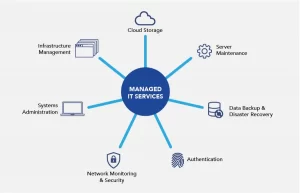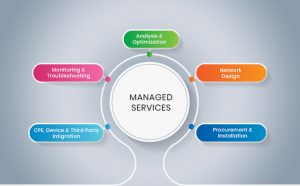Managed services are a type of outsourcing that involves the practice in which companies outsource their responsibility for maintaining and anticipating certain processes. This can be used to improve operations while cutting expenses at no extra cost! The services that can be managed are typically IT-related, such as network infrastructure, data-storage capacity, office productivity software, or security. The client company contracts with a service provider to take on this responsibility, often for a monthly fee. The focus of managed services is on proactive maintenance and anticipating needs before they become problems that disrupt business operations. By working with a trusted partner who has expertise in managing these services, businesses can free up their own resources to focus on their core competencies and goals. Managed services can provide significant benefits in terms of cost savings, improved efficiency, and peace of mind. When choosing a managed services provider, it is important to select a company with a proven track record and the ability to scale up or down according to your company’s changing needs.
Table of Contents
Why Do We Need Managed Services?

In the business world, time is money. That’s why managed services are such an important part of running a successful operation. Managed services allow businesses to outsource key functions to a team of experts who can handle everything from IT support to human resources. This frees up the business owner to focus on more important things, like growing the business. In addition, managed services can save businesses money in the long run. By outsourcing key functions, businesses can avoid the high cost of hiring and training in-house staff. Managed services also provide a team of experts who are up-to-date on the latest industry trends. This means that businesses can avoid the costly mistakes that can be made by trying to do everything in-house. When it comes to running a successful business, managed services are an essential piece of the puzzle.
Read More: Microsoft Office 365 Product Key For Free In 2022
How Does It Work?
Most businesses today rely on some form of IT to keep their operations running smoothly. However, managing an in-house IT department can be a time-consuming and expensive proposition. Managed services provide an alternative by outsourcing the management of IT systems to a third-party provider. This approach can help to minimize costs and maximize efficiency by allowing businesses to focus on their core competencies. Managed services can include a wide range of activities, from monitoring and maintaining networks to providing Help Desk support. In many cases, managed service providers (MSPs) will work closely with businesses to develop custom solutions that meet their specific needs. As a result, managed services can offer a number of advantages for businesses of all sizes.
Popular Managed Services Practices

Managed services providers (MSPs) offer a wide variety of IT services to businesses and organizations of all sizes. By outsourcing these services, MSPs are able to provide their clients with a stable and secure IT infrastructure that is always up-to-date. In addition, MSPs can help to save their clients money by reducing the need for in-house IT staff. Some of the most common managed services include network security, data backup and recovery, and email hosting. However, MSPs can also tailor their services to meet the specific needs of their clients. As a result, managed services practices have become an essential part of running a successful business in the 21st century.
There are a variety of managed IT services that businesses can choose from.
- One popular option is managed network services, which can help companies to keep their networks running efficiently. Managed network services can include tasks such as monitoring traffic levels, managing security settings, and performing software updates.
- Another popular option is managed desktop services, which can help businesses to keep their computers running smoothly. Managed desktop services can include tasks such as troubleshooting software issues, installing updates, and providing user support.
- In addition, there are also managed security services, which can help businesses to protect their data from cyber threats. Managed security services can include tasks such as implementing password management policies, encrypting data, and performing regular security audits. By working with a managed IT service provider, businesses can select the specific services that they need in order to manage their IT infrastructure effectively.
How Much Does It Cost?

The cost of managed services varies depending on the size of the business and the services provided. Managed service providers typically charge a monthly fee for their services. This fee can be based on the number of devices, users, or locations that need to be managed. The provider may also offer discounts for long-term contracts or for bundling multiple services together. In general, managed services cost between $100 and $500 per month per device or user. For small businesses with limited IT needs, managed services can provide a cost-effective way to outsource IT tasks. For larger businesses with more complex IT infrastructure, managed services can provide a comprehensive solution that helps to improve efficiency and reduce costs.
Read More: Windows XP Product Key For Free [100% Working]
Advantages Of Managed Services

As any business owner knows, managing a business can be a time-consuming and complicated process. From keeping track of inventory to managing payroll, there are a lot of moving parts to keep track of. Fortunately, there is a solution. Managed services is a type of business outsourcing that can take care of many of the day-to-day tasks that businesses have to deal with. This can free up businesses to focus on more important tasks, such as innovation and growth. In addition, managed services can also help businesses to save money. By outsourcing tasks to an expert team, businesses can avoid the need to hire in-house staff or purchase expensive equipment. As a result, managed services provide a number of advantages for businesses of all sizes.
The advantages of managed services include increased efficiency and cost savings. When a company outsources the management of a process or service, it can focus on its core competencies and leave the day-to-day management to the experts. This can lead to increased efficiency and improved quality of service. In addition, managed services can be less expensive than if a company were to manage the same process or service internally.
Disadvantages Of Managed Services

One potential downside of managed services is that they can be expensive. In addition, businesses that sign up for managed services may be locked into a contract with the provider, making it difficult to switch providers if they are unhappy with the service. Another disadvantage is that businesses may have to cede some control over their IT systems to the provider. Finally, managed services may not be a good fit for businesses that have highly complex IT systems. Overall, managed services can be a helpful way for businesses to offload some of the responsibility for their IT systems, but there are some potential disadvantages to consider as well.
Follow TechSurfer For More Updated News About Technology.






